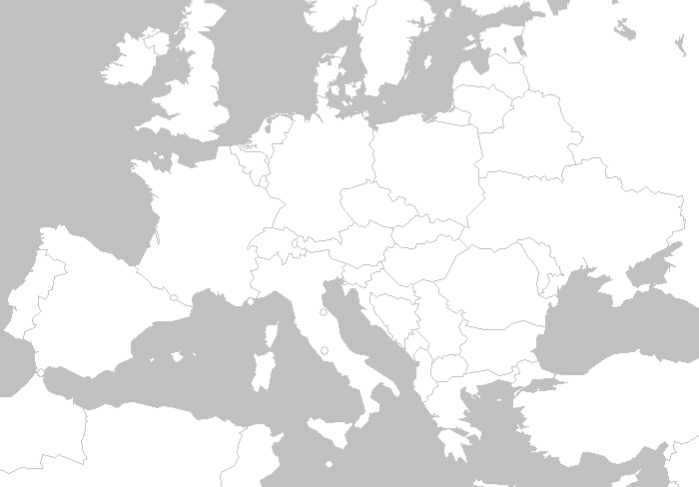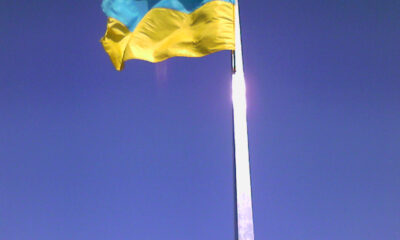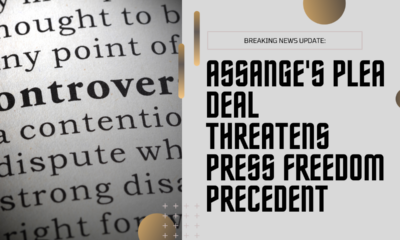Civilization
The Identity Divide That Defines Central Europe’s Stance on Ukraine
Central Europe does not have a unified stance on Ukraine, because identities within it are deeply divided along ideological lines.

As the more hesitant members of Europe’s pro-Ukraine coalition, Hungary, Austria, and Slovakia wield disproportionate sway over the EU’s consensus-driven decisions on Ukraine. Viktor Orban, Hungary’s right-wing Prime Minister, persistently hinders the approval of nearly every EU aid package for Kyiv. Left-leaning populist Slovak Prime Minister Robert Fico pledged to likewise oppose these measures during the next EU summit. The centrist Austrian government, meanwhile, has been one of the staunchest opponents of EU sanctions on Russian hydrocarbons.
Seeming ideological differences between these governments belie what they share in common – each seeks national autonomy and denies that their countries are full members of the Western community. Conversely, their liberal domestic opposition parties, such as the Hungarian Momentum Movement, Austrian NEOS, and Slovak Progressive Slovakia, all support Ukraine and view their countries as a full part of the integrated Western world. The political cleavage on Ukraine aid runs deep along an identity divide – do governing parties perceive their countries as full members of the Western world?
While a country can generally be Western and espouse similar values and historical traditions, it might seek to distance itself from the rest of the Western community. This national identity can change over time, with new governments redefining the relationship.
Western-oriented governments demonstrate solidarity with other Western nations and, in a team-like fashion, adhere to a common consensus. Autonomy-oriented parties, in contrast, defy the collective when they do not agree with it. Hungary’s Viktor Orban, for instance, characterizes the European pro-Ukraine consensus as a “whistle” from Brussels. Meanwhile, his Western-oriented political opponent, Peter Marki-Zay, labels Orban’s stance on Ukraine as a “betrayal” of Hungary’s EU and NATO allies and warns against the international exile of Hungary.
Western-oriented parties also support deeper integration within Western institutions like the EU and NATO. Autonomy-seeking forces strive to limit this integration. Austrian establishment parties, such as ÖVP and SPÖ, support neutrality and reject membership in the key Western institution of NATO, while the liberal opposition party NEOS expresses openness to joining the Euro-Atlantic alliance. Orban opposes European integration in the political sphere, rejecting the rule of law conditionality on EU funds’ disbursement. Hungary’s united opposition, in contrast, seeks deeper European integration by pledging to join the European Public Prosecutor Office and potentially even introduce the euro.
Last, those who imagine themselves as a full part of the Western world express a stronger commitment to Western values, such as liberal democracy and rules-based international order. Orban’s realism, however, rejects that the liberal international order exists and states that the West’s support for liberal values abroad is a farce veiling pursuit of power. “Central Europe,” he says, “is simply a chessboard for the world’s great powers.” Slovakia’s Fico, in turn, presided over the erosion of press freedom in his previous term as the Prime Minister, failing to respond to the murder of a Slovak investigative journalist by his own entourage in 2018. Western-oriented liberal Progressive Slovakia, the main opposition party, has hence built its entire image calling for the rule of law in defiance of Fico’s corruption.
United in solidarity and international institutions around liberal democratic values, Western-oriented parties tend to support Ukraine because it is a fellow, integral member of the Western “team.” Slovak liberal opposition party Progressive Slovakia states that “no country has sacrificed as much for European ideals in recent decades as our eastern neighbor [Ukraine].”
Autonomy-oriented political parties feel no such obligation to support Ukraine as a fellow “teammate” because these parties do not see themselves as full-fledged members of the Western “team” to begin with.
Western-oriented forces also perceive the Russian threat more acutely than their domestic opponents because the Kremlin seeks to destroy democracy, freedom, and open society – the values on which the modern West stands. Hungarian opposition leader Marki-Zay criticizes Orban for attacking the EU, Hungary’s main ally that shares its Western values, and instead partnering with illiberal Russia and China, which Marki-Zay says are Hungary’s real enemies. In contrast, Orban looks at external partnerships through a more realist lens, arguing that geopolitical interests dictate the development of “global connections” with everyone despite differences.
Distrustful of the West and skeptical of its proclaimed adherence to liberal values abroad, autonomy-oriented forces tend to view moral calls to support Ukraine as yet another manipulation by “the system.” Austrian far-right FPÖ, for instance, views EU sanctions on Russia as a deliberate exploitation of Austria by self-interested “Brussels bureaucrats.”
The U.S., EU, and Ukrainian governments should thus abstain from moral arguments in their diplomacy with the three countries, even though Russia’s invasion violates every aspect of morality. The pro-Ukraine coalition should instead rely on pragmatic reasoning, arguing that military aid to Ukraine helps Hungary, Austria, and Slovakia tackle the Russian threat to their security with no own human losses and at a low financial cost, all with the actual war waged thousands of kilometers away from their borders. The EU should also continue offering both negative and positive financial incentives to the three countries during the EU’s foreign policy votes.
Recognizing the Ukraine policy in these three countries is the product of domestic politics, the U.S. and EU should double down on their democracy assistance programs and focus on supporting civil society groups that promote institutional integration within the EU and NATO and advocate for the values of liberalism, international legal order, and democracy in domestic political debates.
This discussion about the national identity of Hungary, Austria, and Slovakia – how much do they perceive themselves as a part of the Western world? – will continue to define their stance on Ukraine. The political division on Ukraine in Central Europe runs deep and uncovers the broader vision governing parties imagine for their countries.
This article was originally published by RealClearDefense and made available via RealClearWire.
Oleksii Antoniuk studies Economics in his fourth year at Yale University. He is a research assistant at Yorktown Institute and a former summer intern at the International Republican Institute (IRI).
-

 Executive5 days ago
Executive5 days agoSecret Service chief gets no solace
-

 Executive3 days ago
Executive3 days agoWaste of the Day: Louisville Taxpayers Pay Nearly $600,000 For Empty Building’s Maintenance, Security
-

 Guest Columns5 days ago
Guest Columns5 days agoFear Itself: Democrats’ Favorite Strategy Caused Their Current Chaos
-

 Executive4 days ago
Executive4 days agoWhere is Joe Biden – or Jill?
-

 Executive2 days ago
Executive2 days agoWaste of the Day: Throwback Thursday: Cities Used Crime Prevention Funds on Soccer Games, Paper Shredding
-

 Executive3 days ago
Executive3 days agoFacile and politically motivated suggestions
-

 Civilization5 days ago
Civilization5 days agoBuild Iron Dome in the United States To Prepare for Israel’s Worst Day
-

 Executive2 days ago
Executive2 days agoBiden makes farewell whisper










